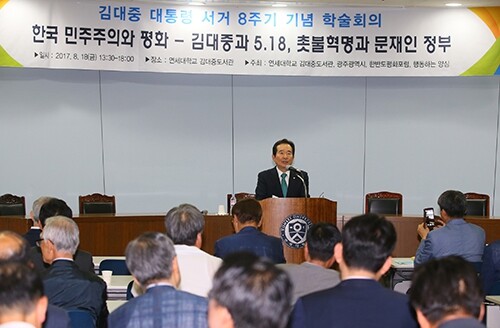hankyoreh
Links to other country sites 다른 나라 사이트 링크
Academic conference held to commemorate the 8th anniversary of former President Kim Dae-jung’s death

On Aug. 18, the very day that South Korean President Moon Jae-in announced he would uphold the Sunshine Policy of former President Kim Dae-jung, an academic conference on the 8th anniversary of Kim’s death elicited repeated concerns and criticism about Moon’s policies on unification, foreign affairs and national security. Along with the argument that Moon’s policies during his first hundred days in office have been biased toward the US, academics said that the Moon administration should dispense with the North Korean policy of the previous conservative governments and push for unconditional inter-Korean dialogue.
Lee Jong-seok, a former Unification Minister in the Roh Moo-hyun administration, was a panelist in the first session of the academic conference , titled “How Will the Moon Administration Keep the Peace?” which was held at the Kim Dae-jung Presidential Library at Yonsei University in Seoul.
“Why didn’t the Moon administration remind Trump [during the recent tensions between North Korea and the US] that he had agreed to resolve the North Korean nuclear issue through peaceful means? Only by clearly declaring our position to the US can we gain room to maneuver,” Lee said.
“From an outsider’s point of view, the truth is that [President Moon] has drawn closer to the US,” said Lee Geun, a professor at the Graduate School of International Studies at Seoul National University. As examples, Lee mentioned how Moon had ordered the temporary deployment of additional THAAD launchers after North Korea launched a second Hwasong-14 missile at the end of last month and how Moon had said in a press conference on his 100th day in office on Aug. 17 that North Korea would cross a red line if it weaponized a completely functional nuclear-tipped ICBM.
In his keynote speech at the conference, Choe Jang-jip, Professor Emeritus at Korea University stated that, “Peace on the Korean Peninsula cannot be achieved unless South Korea becomes a player that is independent from the US.”
The moderator of the session was Moon Chung-in, professor emeritus at Yonsei University and President Moon’s special advisor for unification, foreign affairs, and national security. “My understanding is that [President Moon] made those remarks because he shares a sense of the threat with our ally [the US]. The president was basically sending a message to North Korea,” Moon Chung-in said during the discussion.
“After the Moon administration has solidified the South Korea-US alliance, [China] appears to be intent on dealing with other issues,” said Lee Hui-ok, an expert on China and the director of the Sungkyun Institute of China Studies. Lee suggested that the joint statement released by the leaders of South Korea, the US and Japan last month was, “the prelude to security cooperation between the three countries, which is China’s greatest concern.”
Some experts also described the Moon administration’s policy of simultaneously applying sanctions on and seeking dialogue with North Korea as being “disjointed” and “abstract.”
“The Moon administration needs to declare that the overreliance on sanctions in the North Korean policies of former presidents Lee Myung-bak and Park Geun-hye was a failure. We need methods and strategies that provide the North Korean regime with what looks like a more certain security guarantee than nuclear weapons,” Lee said. Most of the participants in the conference agreed that the Moon administration needs to participate in unconditional dialogue with the North. While recognizing that Moon has only been president for a hundred days, they warned that unless the government quickly fleshes out its foreign policy and security policy, the present instability on the Korean Peninsula could continue for a substantial period of time.
By Kim Ji-eun and Noh Ji-won, staff reporters
Please direct questions or comments to [english@hani.co.kr]

Editorial・opinion
![[Column] Park Geun-hye déjà vu in Yoon Suk-yeol [Column] Park Geun-hye déjà vu in Yoon Suk-yeol](https://flexible.img.hani.co.kr/flexible/normal/500/300/imgdb/original/2024/0424/651713945113788.jpg) [Column] Park Geun-hye déjà vu in Yoon Suk-yeol
[Column] Park Geun-hye déjà vu in Yoon Suk-yeol![[Editorial] New weight of N. Korea’s nuclear threats makes dialogue all the more urgent [Editorial] New weight of N. Korea’s nuclear threats makes dialogue all the more urgent](https://flexible.img.hani.co.kr/flexible/normal/500/300/imgdb/original/2024/0424/7317139454662664.jpg) [Editorial] New weight of N. Korea’s nuclear threats makes dialogue all the more urgent
[Editorial] New weight of N. Korea’s nuclear threats makes dialogue all the more urgent- [Guest essay] The real reason Korea’s new right wants to dub Rhee a founding father
- [Column] ‘Choson’: Is it time we start referring to N. Korea in its own terms?
- [Editorial] Japan’s rewriting of history with Korea has gone too far
- [Column] The president’s questionable capacity for dialogue
- [Column] Are chaebol firms just pizza pies for families to divvy up as they please?
- [Column] Has Korea, too, crossed the Rubicon on China?
- [Correspondent’s column] In Japan’s alliance with US, echoes of its past alliances with UK
- [Editorial] Does Yoon think the Korean public is wrong?
Most viewed articles
- 1[Column] Park Geun-hye déjà vu in Yoon Suk-yeol
- 2Thursday to mark start of resignations by senior doctors amid standoff with government
- 3N. Korean hackers breached 10 defense contractors in South for months, police say
- 4[Editorial] New weight of N. Korea’s nuclear threats makes dialogue all the more urgent
- 5Will NewJeans end up collateral damage in internal feud at K-pop juggernaut Hybe?
- 6Kim Jong-un expressed ‘satisfaction’ with nuclear counterstrike drill directed at South
- 7[Editorial] Japan’s rewriting of history with Korea has gone too far
- 8[Column] ‘Choson’: Is it time we start referring to N. Korea in its own terms?
- 9[Cine feature] A new shift in the Korean film investment and distribution market
- 10[Column] The clock is ticking for Korea’s first lady